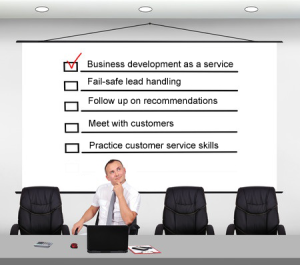 “I’ll know it when I see it” is a phrase often used to describe a thing or situation which is typically subjective in nature and cannot be clearly defined. However, when it comes to empathy perhaps a better way to describe it is “I’ll know it when I feel it”.
“I’ll know it when I see it” is a phrase often used to describe a thing or situation which is typically subjective in nature and cannot be clearly defined. However, when it comes to empathy perhaps a better way to describe it is “I’ll know it when I feel it”.
In our workshops we talk a lot about empathy and in fact, it is hard to define. Empathy is not what we do so much as how it is reflected (or not) in what we do. As a result, empathy really can’t be seen, but it can be felt. And, interestingly enough, it is most often felt in the smallest, most common of actions.
I was reminded of the importance of small things that reflect empathy just last week and how it can make such an important difference. I was at my mother’s house when the HVAC technician arrived to check the air conditioning system before the weather got too hot. I answered the door to a bright, clean and friendly young man with a warm smile. Here are four little things that he did during the course of his work that demonstrated that he had empathy.
Warm greeting with a smile. “Good morning Mrs. Baston. My name is Eric and I am with ABC Mechanical. I have come to complete the spring start-up of your air conditioning system. May I come in?”.
Taking time to understand the customer’s situation. Before he got to work he asked my mother if she had had any questions about the heating or cooling. Did everything seem to be working okay? Any problems?, etc. He then explained that he would like to start with the programmable thermostat. He asked if she had any questions about the programming.
Keeping the customer informed. Eric explained exactly what he was going to do. Firstly he would check things out downstairs. When that was done, he explained that he would be going to inspect and clean the air conditioner itself.
Explaining the work that was done. When completed Eric explained exactly what he had done and went over the checklist while confirming understanding. He explained that he had found something about the furnace that needed attention and would be putting in a work order for a part to be replaced. He explained that my mother would be receiving a call in the next few days to schedule the part’s replacement. “No charge Mrs. Baston. It’s all under warranty.” Again, he asked my mother if she had any questions.
Being in the customer service business, I couldn’t help but ask if his company did any customer service training. “All the time”, he said. “We talk about customer service constantly. We take it very seriously and measure our performance. You know, I always score at the top”, he said proudly. No kidding, I thought.
So here it was, as fine an example of empathy as one is likely to feel. Eric did nothing fancy, nothing special, just simple actions that showed that he really did care. “I’ll know it when I feel it”. I certainly felt it that warm day in June.
I’d love your feedback on this. And as always, please feel free to leave a link back to your own blog if you have one via the commentluv feature here on the site. If you are reading this blog post via email, you will need to locate this post on my website by clicking here. Scroll down to the bottom of the page where you will find the comment section.
Jim
“From caring comes courage.”
Lao Tzu


 How we define the world impacts our perception of it. How we define our technicians’ role in promoting our services is no exception. This blog post is about the limiting reality of getting technicians to “sell” and the 4 reasons why this is the case.
How we define the world impacts our perception of it. How we define our technicians’ role in promoting our services is no exception. This blog post is about the limiting reality of getting technicians to “sell” and the 4 reasons why this is the case.
 If you are actively engaging your technicians in promoting your services, here are 5 questions to help you evaluate how proactive your service team is. These questions are part of our ‘How Proactive is Your Service Team’ Checklist.
If you are actively engaging your technicians in promoting your services, here are 5 questions to help you evaluate how proactive your service team is. These questions are part of our ‘How Proactive is Your Service Team’ Checklist. Frustrated by the poor quality of the information provided by your technicians on work orders? The importance of the quality of the work order resolution description is often overlooked. The fact is the quality of this information is very important! Below are 4 easily remembered components that your technicians can include to better communicate the value of the work they have performed. The four components are captured using the acronym CARE.
Frustrated by the poor quality of the information provided by your technicians on work orders? The importance of the quality of the work order resolution description is often overlooked. The fact is the quality of this information is very important! Below are 4 easily remembered components that your technicians can include to better communicate the value of the work they have performed. The four components are captured using the acronym CARE.
 How is your business really doing was the subject of my
How is your business really doing was the subject of my  Whenever I speak on the subject of Proactive Service® , invariably someone will ask me how do we really know how we are doing? I mention that there are several measures to consider. Higher sales and revenues, increased customer satisfaction and improved levels of customer retention are just a few to consider. However, if you really want to know how you are doing, here are 2 questions to ask your customers through your surveys and during face-to-face visits:
Whenever I speak on the subject of Proactive Service® , invariably someone will ask me how do we really know how we are doing? I mention that there are several measures to consider. Higher sales and revenues, increased customer satisfaction and improved levels of customer retention are just a few to consider. However, if you really want to know how you are doing, here are 2 questions to ask your customers through your surveys and during face-to-face visits: “I’ll know it when I see it” is a phrase often used to describe a thing or situation which is typically subjective in nature and cannot be clearly defined. However, when it comes to empathy perhaps a better way to describe it is “I’ll know it when I feel it”.
“I’ll know it when I see it” is a phrase often used to describe a thing or situation which is typically subjective in nature and cannot be clearly defined. However, when it comes to empathy perhaps a better way to describe it is “I’ll know it when I feel it”. In our programs, we dedicate a portion of our time to presenting an effective technique for taking the stress out of challenging situations. We discuss the impact of stress in emotional situations and the important role that we play as technicians to reduce it. The power of this technique was brought home to me last week.
In our programs, we dedicate a portion of our time to presenting an effective technique for taking the stress out of challenging situations. We discuss the impact of stress in emotional situations and the important role that we play as technicians to reduce it. The power of this technique was brought home to me last week.

